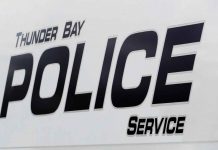THUNDER BAY – The inquest into the death of two Indigneous men who died in custody at the Thunder Bay Police Headquarters has seen the four person all caucasian jury determine that the 2014 death of Don Mamakwa was of indetermined cause, and the death of Roland McKay was of natural causes.
Four weeks of testimony examining the cases of the two Oji-Cree men saw the jury reach those verdicts in Thunder Bay, on Friday.
The jurors have released 35 recommendations, determined 8 years after Mamakwa was arrested and died.
Mamakwa, 44, of Kasabonika Lake and McKay, 50, of Kitchenuhmaykoosib Inninuwug were found without vital signs in police cells after they were arrested for public intoxication.
Rachel Mamakwa, sister of Don Mamakwa, commented: “We want to the thank the jury for their hard work during the inquest. We understand arriving at this verdict was not an easy task. We were hoping the jury would find Don’s death to be a homicide, but we are happy that there has been a public airing about the horrible way that Don was treated. He deserved so much better. We appreciate the recommendations that were put forward so that no other family will have to go through this.”
Denise Tait, a niece of both Don Mamakwa and Roland McKay commented: “Our families are relieved it is over so we can finally start our healing journey and let them rest. All my family has ever wanted was to find out what happened to my uncle. We are happy that we now have those answers. We want to thank the jury for their work during this four-week inquest.”
Lawyer Asha James, who acts for the Mamakwa and McKay families, stated, “While the jury may not have agreed with the family’s submission regarding the manner of death of Mr. Mamakwa, they have returned a powerful slate of recommendations aimed at addressing these tragic deaths and preventing any future similar tragedies. The recommendations directed to the police services board sends a strong message that they have a lot of work to do to rebuild the trust of the Indigenous community and they will have to publicly show the progress, or lack thereof, in its implementation of recommendations from all the reports, inquests, inquiries that have spoken up about the Board’s disfunction.”
Mamakwa’s family had been seeking that his death be classified as a homicide, a decision that does not carry criminal liability.
The 35 recommendations, created with the goal of preventing future such deaths, are aimed at various agencies, including: paramedics, Thunder Bay Police Service and the Thunder Bay Police Services Board as well as the Ontario government.
While the parties at the inquest largely agreed on the key questions and important recommendations, there was a divide on a few key issues, namely the manner of death for Mamakwa — whether it was homicide, natural or undetermined after presiding coroner David Cameron ruled earlier Friday that accident and suicide should not be considered.
2 men ‘in our hearts and mind’: jurors
A member of the jury read a statement before the jury revealed it’s decision aloud to the families to express their condolences.
“These past four weeks have been very difficult for everyone involved here. Your presence here every day reminds us Don and Roland were fathers, sons, siblings, and much more. But mostly, that they mattered”.
“We hope this brings you peace and closure, knowing the decisions made here were to the best of our abilities, with Don and Roland in our hearts and minds.”
The jury heard evidence that Mr. Mamakwa’s requests to go to the hospital were refused, his medical issues minimized, and ultimately, he was left unattended in the police cell for upwards of five hours.
The jury ruled Mamakwa died in the cell at 12:03 a.m. on Aug. 3, 2014, but his body was not found for hours later.
Mamakwa died of ketoacidosis, a serious complication of Type 2 diabetes, alcohol use disorder and sepsis (when the body’s response to an infection damages its own tissues).
An emergency-room physician Dr. Alim Pardhan testified there was a 97 per cent chance Mamakwa would have survived the night if he was brought to the hospital instead of a police cell.
Earlier in the day, presiding coroner Cameron issued directions to the jury, saying the classification of “undetermined” would be appropriate if, after full investigation, there was not sufficient evidence for the death to fall under any one classification, or if there was equal, competing evidence for multiple death classifications.
The recommendations
Many of the recommendations are not a surprise, having come up a number of times during the inquest. Those include:
Developing a task force to create a safe sobering centre in Thunder Bay.
More training and co-ordination between police and paramedics at the scene of 911 calls.
Additional supports for people living with alcohol use disorder and other addictions, like expanded beds at the Balmoral Withdrawal Management Centre and at Shelter House’s managed alcohol program.
Ontario’s Ministry of Health adjust its funding formulas for health services to reflect the reality that Thunder Bay is a regional hub for services.
Each of the organizations issued the recommendations will have six months to implement them, and report back to Ontario’s chief coroner. Their responses will be made public.







